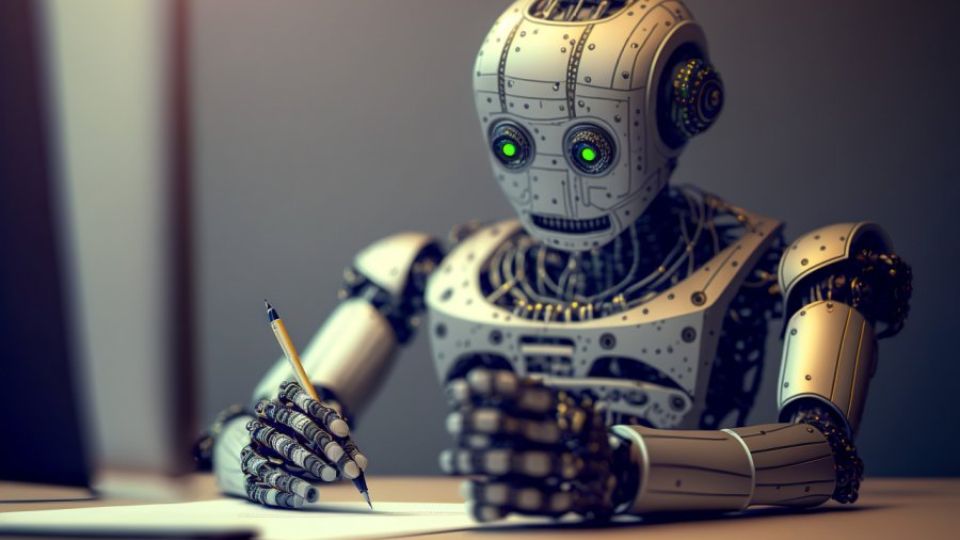February 3, 2023
SEOUL – Just a couple days ago, I spoke to ChatGPT, the revolutionary artificial intelligence chatbot everyone is gushing about.
Yes, it was beyond impressive watching the bot produce concise pieces of writing on any given topic with relevant info extracted from mostly English-language sources on the web within seconds. It even spilled out a nice short story about AI and aliens as soon as I asked for it.
It may soon be practically pointless for humans to write simple articles, solve math problems or write computer code, other than for learning purposes, because AI is better and so much faster.
But I also found one area that AI would never beat us in: making people laugh.
When I asked the bot, developed by OpenAI, to tell its funniest joke, it responded: “Why did the tomato turn red? Because it saw the salad dressing.”
I demanded it do better, but it just churned out a couple more jokes that might make a third grader giggle.
As the world fears that AI might steal most of our jobs, I had thought the only worthwhile activity left for humans in the end may be performances using the human body like dance, sports or acrobatics.
But of course, the subtle art of saying something startlingly hilarious, but not totally unexpected, at the right moment is something only humans with high emotional intelligence can do.
The bot admitted: “No, I cannot be funnier than humans. Humor is subjective and often depends on personal experiences, cultural background and individual sense of humor. I can provide jokes, but my humor might not always resonate with everyone.”
It’s hard to tell. If the likes of Larry Page, Sergey Brin or Elon Musk for some reason decide to develop a bot committed to cracking people up, it may reach a level that threatens or discourages humorists and comedians.
But tech whizzes are unlikely to do that because humans normally don’t start a costly and difficult task unless there is a good reason. The point of having AI bots — or any robot — is to make them do things we don’t want to do so we can spend more time on what we enjoy. Making people laugh falls in the latter category. There’s no way humans would give that joy away to machines.
As we hone our comedic skills to maintain a competitive edge over AI, we should also look at how these bots will affect our lives and our children’s lives in the near future.
The most immediate impact of ChatGPT is to be felt in the world of education.
Although OpenAI said it’s working on digitally watermarking ChatGPT’s output to help detect AI-generated text in students’ essays, there will soon be other chatbots and apps to get around that. So instead of focusing on policing AI-assisted cheating, tech experts advise teachers to utilize it as a new learning tool.
Teachers, for example, can let students use ChatGPT to create outlines for their essays, and then have them write the essays longhand in class without their laptops or phones. Kids can also use it as a tutor or debate partner. Another way it could be used is as a tool for nurturing students’ critical thinking, as AI reflects human biases and prejudices, experts say.
Koreans are lucky in a way because we still have some time before a Korean-language bot of this caliber will be developed.
Until then, we can observe how educators and students in English-speaking countries adapt to this new wave of change, and prepare ourselves to use it to our benefit.
For now, a simple interaction with ChatGPT would be enough to give us a reality check on the state of Korean education.
The developed world has moved on to curricula that help students think critically and synthesize knowledge through essays and debates, but Koreans are still harassing children and teenagers by making them learn things years ahead of their grade to later focus on “technical” training for specific exams.
For instance, private cram schools, known as hagwon, teach students tricks to find answers on the multiple-choice Suneung – Korea’s College Scholastic Ability Test — without spending too much time to understand the passages, some of which feel incomprehensible even for adults. For math, kids review as many types of questions as possible so when they see test questions, they know how to solve it from memory.
But this is what AI does best.
As future supervisors and commanders of AI, we need to foster independent thinkers who can build their own ideas based on knowledge, effectively communicate them and connect the dots to make good judgments.
Humans with a knack for inducing laughter are likely to be in greater demand than those who can crack Suneung questions.
Because even in the AI-powered future, humans will always love those who make them laugh.


